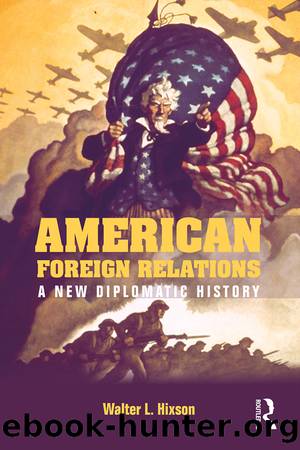American Foreign Relations by Walter L. Hixson

Author:Walter L. Hixson [Hixson, Walter L.]
Language: eng
Format: epub
Tags: History, General, Military, United States, Political Science, International Relations
ISBN: 9781135021108
Google: Xy-vCgAAQBAJ
Publisher: Routledge
Published: 2015-10-08T01:26:13+00:00
Source: Library of Congress, Prints and Photographs Division, LC-USZ62-72424.
The perception that âNorth Koreaâ invaded âSouth Koreaâ obscured the civil tumult that had roiled the peninsula for years prior to June 25, 1950. Although the Soviets had given Kim their approval, until the United States intervened the conflict was a civil war being fought out exclusively among Koreans rather than an international conflict.
Truman called the US intervention a âpolice action,â thus bypassing a congressional declaration of war and heightening the power of the executive branch in the process. Congress and the public overwhelmingly supported US military intervention in any case, as the cold war consensus to contain communism was deeply ensconced. The United States marshaled UN backing for the intervention, support that could have been vetoed by the Soviets had they not been boycotting the UN Security Council over its refusal to seat âRedâ China. The UN had thus become thoroughly politicized by the cold war. Despite the UN vote the subsequent campaign was overwhelmingly a US war, planned and waged by American commanders and soldiers and with the United States taking 90 percent of the casualties on the âAlliedâ side.
The outbreak of a major war in Korea prompted Trumanâs approval of National Security Council paper 68 (NSC 68), a policy paper that remained classified until 1975. NSC 68 defined the cold war as an existential crisis, âa real warâ that would end in âthe fulfillment or destruction not only of this Republic but of civilization itself.â Communism was a âfanatic faithâ that promoted âslaveryâ and sought âabsolute authority over the rest of the world.â NSC 68 framed the cold war in stark and simple terms, a battle of good versus evil with little room for complexity or gray areas. The policy paper urged dramatic increases in military spending to defeat the demonic foe. Following Trumanâs approval of NSC 68 on September 30, the defense budget soared from $13 billion in 1950 to $48.7 billion in 1953.
The momentum of fighting on the Korean Peninsula swung wildly in a matter of months. With MacArthur in command the United States pulled off a risky amphibious landing of troops at Inchon and within weeks reversed the course of the war and threatened to rout Kimâs forces. At this point MacArthurâs towering prestige led to disaster. MacArthur, who had made good on his vow to return to the Philippines in triumph during the Pacific War, insisted that the United States should seize control of the entire Korean Peninsula and ring up a decisive victory against communism. Anxious to silence their critics after being savaged for losing China, Acheson and Truman and the JCS followed MacArthurâs lead.
In November 1950, as US forces drove Kim toward the Yalu River on the Chinese border, the PRC poured hundreds of thousands of troops across the border to attack US and South Korean forces. The Chinese intervention caught the Americans by surprise and changed the course of the war overnight. Though suffering massive losses, Chinaâs headlong assault sent the US
Download
This site does not store any files on its server. We only index and link to content provided by other sites. Please contact the content providers to delete copyright contents if any and email us, we'll remove relevant links or contents immediately.
| Central Africa | East Africa |
| North Africa | Southern Africa |
| West Africa | Algeria |
| Egypt | Ethiopia |
| Kenya | Nigeria |
| South Africa | Sudan |
| Zimbabwe |
Goodbye Paradise(3810)
Men at Arms by Terry Pratchett(2838)
Tobruk by Peter Fitzsimons(2518)
Borders by unknow(2315)
Arabs by Eugene Rogan(2299)
Pirate Alley by Terry McKnight(2221)
More Than Words (Sweet Lady Kisses) by Helen West(1867)
Belonging by Unknown(1858)
It's Our Turn to Eat by Michela Wrong(1731)
The Biafra Story by Frederick Forsyth(1656)
The Source by James A. Michener(1613)
Botswana--Culture Smart! by Michael Main(1602)
Coffee: From Bean to Barista by Robert W. Thurston(1546)
A Winter in Arabia by Freya Stark(1538)
Gandhi by Ramachandra Guha(1532)
The Falls by Unknown(1527)
Livingstone by Tim Jeal(1489)
The Shield and The Sword by Ernle Bradford(1409)
Africa: Altered States, Ordinary Miracles by Richard Dowden(1385)
